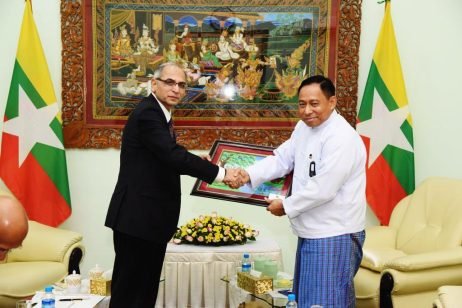India cautioned Myanmar to return to the road of federal democracy on Wednesday, as fighting between armed rebel groups and the Myanmar military in the Shan, Sagaing, and Chin regions grew more intense.
Foreign Secretary Vinay Mohan Kwatra conveyed the message during a consultation between the Foreign Office and a delegation from Myanmar, which was headed by the country’s Deputy Foreign Minister, U Lwin Oo.

The state of bilateral development projects in Myanmar, security, trade, commerce, connectivity, and worries about transnational crimes were among the many topics discussed at the meetings between the two nations.
In a press release issued on Wednesday by the Ministry of External Affairs, India reaffirmed its support for Myanmar’s transition to a federal democracy. Over the past two weeks, the military of Myanmar has been forced to retreat from multiple townships by armed militants.
Thousands of citizens of Myanmar, including former military men, have recently sought asylum in India after protracted fighting.
India’s Concerns on Militarism in Myanmar
Arindam Bagchi, the Ministry of External Affairs’ official spokesperson, voiced “deep concern” about the fighting.
According to Mr. Bagchi, the topics of conversation between the two parties on Wednesday were “security situation, border management, and transnational crimes.”
“The MEA stated that the Indian side said it continued to support people-centric socio-economic developmental projects for the benefit of the people of Myanmar, including connectivity projects and projects under the Rakhine State Development Programme and Border Area Development Programme.”
India’s economic, security, and geopolitical interests motivate its support for the Myanmar government. The majority of Myanmar’s population, who oppose the military rule, has harshly criticized the program and finds it to be extremely unpopular. Crucially, it appears that India’s interests have not been advanced by the approach.
Since the coup in February 2021, India—now headed by Prime Minister Narendra Modi’s Hindu nationalist administration—is reestablishing diplomatic and economic ties with the Myanmar junta. To placate the junta next door, there may be some backing for the democratic resistance, but it is kept under wraps. To put it briefly, India is steadfast in its “pro-engagement, anti-sanctions” approach towards the Myanmar military.

Although India’s fundamental strategy of working with the junta has not altered, there have been some minor changes in the public narrative, particularly in bilateral interactions. Vinay Kumar spearheaded the effort of repairing relations with the coup rule after taking over as India’s ambassador to Myanmar in April 2022.
Over the course of the last year, regular government-to-government communication between India and the junta has been reestablished. In fact, India has now openly acknowledged the junta as Myanmar’s legitimate government for all intents and purposes of diplomacy.
What are the next policies from India?
In its bilateral declarations through 2021, India focused on subjects like the return of democracy and the release of political prisoners. However, New Delhi has subtly stopped mentioning democracy in bilateral discussions during the past year.
The most obvious illustration of this was the substantial disparity in the phrasing and length of Indian news releases following the travels to Myanmar in December 2021 and November 2022, respectively, by foreign secretary Vinay Mohan Kwatra and Harsh Vardhan Shringla.
Meeting with civil society representatives in Myanmar, many of whom are adamantly against the junta, Shringla quietly bemoaned to the coup leadership its failure to stabilize the border between India and Myanmar. Conversely, Kwatra exclusively had meetings with the highest junta leadership.

The statement released during his visit focused largely on matters of bilateral economic cooperation and omitted any reference to the restoration of democracy or the ASEAN Five-Point Consensus.
But in international convention, like the Quad, New Delhi still supports the ASEAN stance on Myanmar. Moreover, the Ministry of External Affairs keeps advocating for an “early restoration of democracy” in both its unilateral declarations and the newly published Annual Report 2022.
India’s current priorities appear to be accelerating its development projects in Myanmar and assisting in the normalization of trade and commercial ties. Naturally, this can be seen in the increasing number of bilateral meetings between the two, even at the ministerial and ambassadorial levels.
The junta’s border affairs minister and India’s Minister of Development of North Eastern Region (DoNER) recently met virtually to discuss a range of topics, including infrastructure projects and border trade. This was the junta’s first official ministerial communication between the two bodies.
Additionally, New Delhi subtly extended a $270 million Line of Credit to the junta in April 2022 for the purpose of “undertaking development projects.”
Myanmar Conflict state
Right after the overthrow of State Counsellor Aung San Suu Kyi’s democratically elected government on February 1, 2021, the Myanmar military has engaged in combat with a growing coalition of long-standing ethnic armed groups, the pro-democracy National Unity Government, and various People’s Defense Forces.
The Myanmar military junta has mainly managed to hold onto the cities and towns despite incurring significant losses from guerrilla fighters operating in rural areas due to a shifting and complex battlefield environment.
The Myanmar military, considered highly unpopular, cruel to people, and not very good tactically, depends on air power and heavy artillery to keep the resistance from gaining and holding territory over populous areas.

Encouraged by the triumph of the Three Brotherhood Alliance in Shan State, People’s Defense Forces units attacked and took control of Khampat, which is close to the Indian border, and Kawlin, a district-level town in Sagaing Region. Fighting in the states of Chin, Kayah, and Rakhine during the past week is more evidence that the junta is faltering.
The border affair of the junta Growing unrest along Myanmar’s borders continues to worry New Delhi, as do the consequences for Northeast India, including an increase in the number of refugees and an increase in the smuggling of contraband. The Modi administration, however, is not considerate to call out the junta for this fresh disturbance.
Overall, India’s communication with the junta has been more transparent. In order to maintain cordial bilateral relations, it also takes into consideration the junta’s sensitivities and refrains from bringing up touchy subjects like the restoration of democracy.











